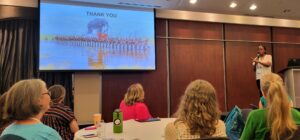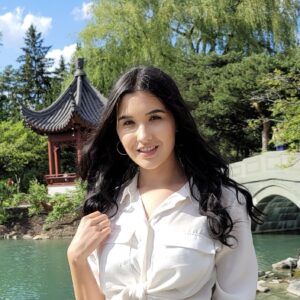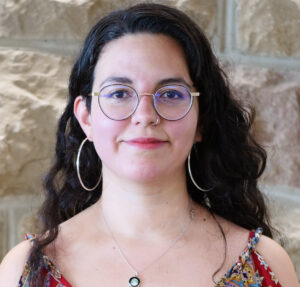Reflecting on research and knowledge co-production in UNESCO Biosphere Reserves and World Heritage Sites
Written by Ela Vermette-Furst and edited by Mariana Campos-Rivera Photo by Mariana Campos-Rivera

This blog post is part of a series reflecting on a selection of sessions and keynotes that were presented at the PECS-III Conference, Montreal Canada, 12-15 August 2024
During the symposium session “UNESCO Biosphere Reserves and World Heritage as test sites for innovative research and knowledge co-production” co-chaired by Katja Malmborg and Jackie Hamilton, we heard from eight scholars working in UNESCO Biosphere Reserves and World Heritage sites across the globe. Through thoughtful reflections and discussions based on a diversity of communities and landscapes, this session treated audience members to a nuanced conversation on the relationship between local communities, researchers, practitioners, and governance systems in the context of UNESCO site designations.
Dr. Helena Freitas and Sènankpon Tcheton spoke about their work at Biosphere Reserve sites. Helena discussed enhancing participatory and intergenerational engagement in Biosphere Reserves through the Community of Portuguese Language Countries Biosphere Reserves Network. This network has successfully “generated a culture of peace” among Biosphere Reserves in Portuguese-speaking countries thanks to the power of sharing a language when uniting for sustainable development across borders. Sènankpon introduced us to his work in the Mono Transboundary Biosphere Reserve (Benin and Togo) with Indigenous and local knowledge holders. His findings demonstrate that the marginalization of Indigenous and local peoples in conservation and the challenges they face, such as financial constraints and exclusion in decision-making are prevalent. Both presenters highlighted that local people have a strong sense of identity and responsibility to the land.
Next, we heard from Carolin Seiferth and Mulako Kabisa, whose experiences working with communities living in UNESCO World Heritage Sites were highly contrasting. Carolin spoke about her work on the Öland Project, a project working with agrarian communities on climate change action in the World Heritage Site on the Island of Öland (Sweden). Carolin found that farmers were pushing for the designation to help increase their capacity for climate action and were seen as knowledge experts throughout the designation process. Mulako’s work on biodiversity and climate governance futures in the Barotse Cultural Landscape of Zambia demonstrated that the designation was controversial among locals as the process was perceived as a way to marginalize local people’s traditional land use and governance structures. The discussion reflected on the different approaches people could have to the UNESCO designation process. While Carolin’s experience demonstrates a bottom-up approach, Mulako’s work demonstrates a top-down approach. The juxtaposition between the two highlighted the importance of meaningful inclusion of local people in World Heritage designation.
Following this discussion, Dr. Elisabeth Måren spoke about the CULTIVATE Project, an international project in Scotland, Norway, Czech Republic and Estonia focusing on understanding the role of cultural heritage in shaping landscapes in Biosphere Reserves. Dr.Elisabeth noted that many people didn’t know they were living in a Biosphere Reserve. Co-chair and presenter Jackie Hamilton noted similar findings in her research on human relationships with trees in the Mont-Saint Hilaire Biosphere Region*. Nonetheless, both researchers found a sense of care in the community members, which could also be linked to the influence that social and cultural dimensions have over the Biosphere Reserves’ biophysical landscape.
Giving a broader view of Biosphere Reserve governance and research, Dr. Lisen Schultz’s findings from a 15-year longitudinal survey on governance across 100 Biosphere Reserves demonstrated the changes in priorities over time. While there have been notable improvements in co-management approaches that support local communities, there are still challenges to be faced, especially when scaling across governance levels. Similarly, Dr. Maureen Reed’s reflections on learning to learn in Biosphere Regions in Canada, Germany, and South Africa highlighted the value of stripping away the “expert” role to create more collaborative ideas for Biosphere Region management. Dr. Maureen used the Transdisciplinary International Learning Lab as an example of how to achieve this. Despite focusing on a larger scale, Drs. Lisen and Maureen offered context-based, insightful reflections on the field, which was a great way to wrap up these wide-ranging conversations.
During the closing remarks, the audience was reminded of an important notion: UNESCO designation can enhance a sense of identity and belonging through meaningful collaboration with communities, however, that sense already exists within communities. Biosphere Reserves and World Heritage Sites offer a novel opportunity to increase community-based capacity to protect the places they call home, but we cannot discount the harmful, ongoing history of marginalization that occurs when imposing designations. Because of this, there is a need to establish models of governance that ensure the ethical inclusion of communities in the creation and management of these sites.
*Biosphere Region is the term used in Canada instead of Biosphere Reserve


